初二英语期中复习提纲(p)
八年级英语上学期期中考试复习提纲
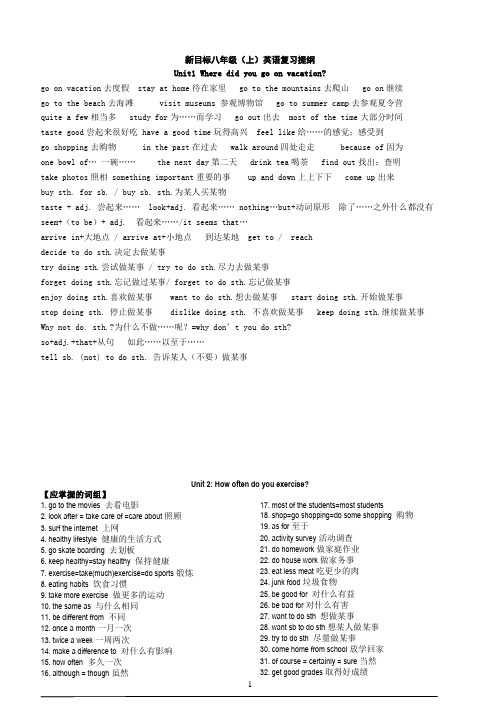
新目标八年级(上)英语复习提纲Unit1 Where did you go on vacation?go on vacation去度假 stay at home待在家里 go to the mountains去爬山 go on继续go to the beach去海滩 visit museums 参观博物馆 go to summer camp去参观夏令营quite a few相当多 study for为……而学习 go out出去 most of the time大部分时间taste good尝起来很好吃 have a good time玩得高兴 feel like给……的感觉;感受到go shopping去购物 in the past在过去 walk around四处走走 because of因为one bowl of…一碗…… the next day第二天 drink tea喝茶 find out找出;查明take photos照相 something important重要的事 up and down上上下下 come up出来buy sth. for sb. / buy sb. sth.为某人买某物taste + adj. 尝起来…… look+adj. 看起来…… nothing…but+动词原形除了……之外什么都没有seem+(to be)+ adj. 看起来……/it seems that…arrive in+大地点 / arrive at+小地点到达某地 get to / reachdecide to do sth.决定去做某事try doing sth.尝试做某事 / try to do sth.尽力去做某事forget doing sth.忘记做过某事/ forget to do sth.忘记做某事enjoy doing sth.喜欢做某事 want to do sth.想去做某事 start doing sth.开始做某事stop doing sth. 停止做某事 dislike doing sth. 不喜欢做某事 keep doing sth.继续做某事Why not do. sth.?为什么不做……呢?=why don’t you do sth?so+adj.+that+从句如此……以至于……tell sb. (not) to do sth. 告诉某人(不要)做某事Unit 2: How often do you exercise?【应掌握的词组】1. go to the movies 去看电影2. look after = take care of =care about照顾3. surf the internet 上网4. healthy lifestyle 健康的生活方式5. go skate boarding 去划板6. keep healthy=stay healthy 保持健康7. exercise=take(much)exercise=do sports锻炼8. eating habits 饮食习惯9. take more exercise 做更多的运动10. the same as 与什么相同11. be different from 不同12. once a month一月一次13. twice a week一周两次14. make a difference to 对什么有影响15. how often 多久一次16. although = though虽然17. most of the students=most students18. shop=go shopping=do some shopping 购物19. as for至于20. activity survey活动调查21. do homework做家庭作业22. do house work做家务事23. eat less meat吃更少的肉24. junk food垃圾食物25. be good for 对什么有益26. be bad for对什么有害27. want to do sth 想做某事28. want sb to do sth想某人做某事29. try to do sth 尽量做某事30. come home from school放学回家31. of course = certainly = sure当然32. get good grades取得好成绩33. some advice34. hardly=not nearly / almost not几乎不35. keep/be in good health保持健康36.be stressed紧张的,有压力的37. take a vacation 去度假48.get back 回来【应掌握的句子】1. How often do you exercise? 你(你们)多久锻炼一次身体?How often + 助动词do(does或did) + 主语+ do sth.? 疑问词how often是问频率(多久一次),(在这里助动词do(does或did) 是起帮助构成疑问的作用)与一般现在时或一般过去时连用,回答一般是用表示频率的副词,如:once, twice, three times…, sometimes, often, quite, often, never, every day, once a week , twice a month , thr ee times a month , three or four times a month 等。
目标英语八年级上册1-6各单元期中复习提纲

回顾Unit 2中涉及的语法点,如名词的复数形式、动词 的时态和语态等。
注意常见语法错误,避免在写作和口语中出现。
Text review
01
深入理解课文内容
02 回顾Unit 2中的课文,理解主题和主要内 容。
03
分析课文中的语言技巧和表达方式,如修 辞、句子结构等。
04
通过讨论和思考,培养批判性思维和独立 分析能力。
05
Unit 5 Review Outline
vocabulary review
掌握课本中列出的重点单词 和短语,包括它们的拼写、
发音和基本用法。
02
掌握核心词汇
01
03
了解单词的词性变化,如名 词变复数、动词变时态等。
能够正确使用所学词汇进行 简单的造句和对话。
04
05
通过练习和阅读巩固词汇知 识,提高词汇运用能力。
Mid term Review Outline for Units 1-6 of 8th Grade
目 录
• Unit 1 Review Outline • Unit 2 Review Outline • Unit 3 Review Outline • Unit 4 Review Outline • Unit 5 Review Outline • Unit 6 Review Outline
03
Unit 3 Review Outline
vocabulary review
掌握核心词汇
熟悉课本中出现的同义词 和反义词,理解其语境和 用法。
掌握课本中列出的重点单 词和短语,包括拼写、发 音和用法。
能够运用所学词汇进行简 单的口头和书面表达,提 高语言运用能力。
最新仁爱英语八年级上期中复习纲要

(仁爱)八年级上期中考试复习纲要---英语一、期中考试时间:11月中旬二、期中考试范围:一、二单元三、考试知识点梳理及典型例题:考点一:be going to、will、be+doing现在进行时结构表示一般将来时①be going to+动词原形,表示即将发生的动作或情况。
be动词随着主语的人称和数的变化而变化;否定句:主语+be+ not+ going to +动词原形一般疑问句:Be+主语+going to +动词原形回答为:Yes, 主语+be; No,主语+be not.特殊疑问句:特殊疑问词+be+主语+going to +动词原形t here be句型用在一般将来时中,其结构为:There is/are going to be…/There will be…注意:have不可以出现在there be句型中;典型例题( )1.—There_____ a talk about how to learn English this Saturday.—Exciting news.A. are going to beB. is going to beC. is going to haveD. will have( )2.There_____ more roads, trees and taller buildings in Beijing in the future.A. is going to beB. will haveC. will beD. are going to have②will/shall+动词原形,表示一般将来时。
shall一般用于第一人称I, we;当人称代词与will连用时,will可缩写为“’ll”否定句:主语+will+not(won’t)+动词原形一般疑问句:Will +主语+动词原形回答:Yes, 主语+ will; No,主语+ won’t.特殊疑问句:特殊疑问词+will+主语+动词原形注意:一般用shall提问的时候,不用shall回答典型例题( )1.—Shall I take my camera for the picnic?—______. It’ll be fun.A. Good idea!B. I’d love toC. I’m sorry to hear thatD. Thanks.( )2.—There_____a basketball game between our class and Class Five this afternoon. Would you like to cheer us on with me?—Yes, I’d love to.A. haveB. will beC. will haveD. are going to③ 主语+be doing,可以用现在进行时表示将来要发生的事,能用于这种情况的动词多是一些表示位置转移的词,例如leave, come, go, arrive, fly等,都可用现在进行时表示将来;典型例题( )1. Li Ping ______the USA the day after tomorrow with her parents.A. leaves toB. left toC. is leaving forD. leaves for( )2. My sister _____Beijing tomorrow. She works there.A. leavesB. is leaving forC. leaves forD. is leaving考点二::主语+谓语动词+间接宾语+直接宾语(Unit 1 Topic 2)在英语中,有些及物动词可以跟两个宾语,一个叫间接宾语,一个叫直接宾语,物作直接宾语,人作间接宾语;主语+谓语+间接宾语(人)+ 直接宾语(物)=主语+谓语+直接宾语(物)+ 介词+ 间接宾语(人)常见的能跟双宾语的动词有:pass, kick, bring, throw, buy, lend等kick sb. sth. = kick sth. to sb. pass sb. sth. = pass sth. to sb.buy sb. sth.= buy sth. for sb.典型例题1. Please pass me the book! (改为同义句)Please pass the book ______ ______.考点三:情态动词的用法(Unit 2 Topic 1,2,3)情态动词后接动词原形,没有人称时态和数的变化;否定形式直接+not;①should / shouldn’t+动词原形,意为“应该/不应该……”,表示现在或将来的义务和责任,也用来表示劝告,提出建议等②had better / had better not+动词原形,意为“最好/最好不要……”,表示对别人的劝告,建议或表示一种愿望。
初二上册期中英语复习题纲
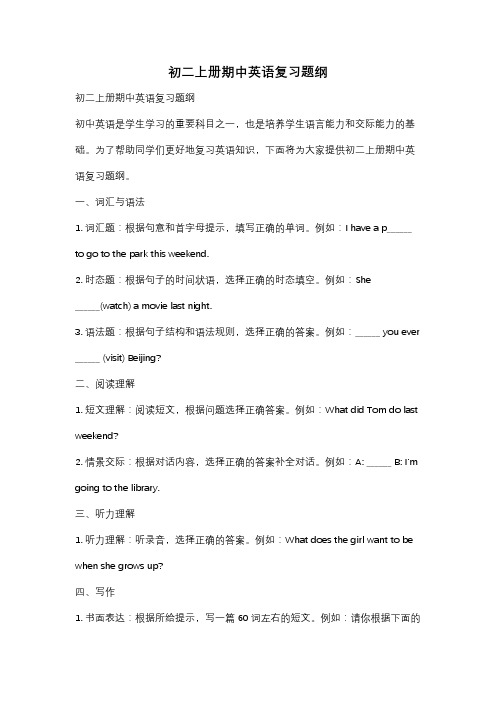
初二上册期中英语复习题纲初二上册期中英语复习题纲初中英语是学生学习的重要科目之一,也是培养学生语言能力和交际能力的基础。
为了帮助同学们更好地复习英语知识,下面将为大家提供初二上册期中英语复习题纲。
一、词汇与语法1. 词汇题:根据句意和首字母提示,填写正确的单词。
例如:I have a p______ to go to the park this weekend.2. 时态题:根据句子的时间状语,选择正确的时态填空。
例如:She______(watch) a movie last night.3. 语法题:根据句子结构和语法规则,选择正确的答案。
例如:______ you ever ______ (visit) Beijing?二、阅读理解1. 短文理解:阅读短文,根据问题选择正确答案。
例如:What did Tom do last weekend?2. 情景交际:根据对话内容,选择正确的答案补全对话。
例如:A: ______ B: I'm going to the library.三、听力理解1. 听力理解:听录音,选择正确的答案。
例如:What does the girl want to be when she grows up?四、写作1. 书面表达:根据所给提示,写一篇60词左右的短文。
例如:请你根据下面的提示,写一篇关于你的家乡的短文。
五、口语交际1. 口语交际:根据所给情景,进行实际对话演练。
例如:A: Can I help you? B: Yes, I'm looking for a bookstore.六、补全对话1. 补全对话:根据对话内容,选择正确的答案,补全对话。
例如:A: ______ B: I'm going to the park.七、改错题1. 改错题:根据句子的语法错误,选择正确的答案进行改正。
例如:She go to school by bike every day.以上就是初二上册期中英语复习题纲的相关内容。
八下英语期中复习资料
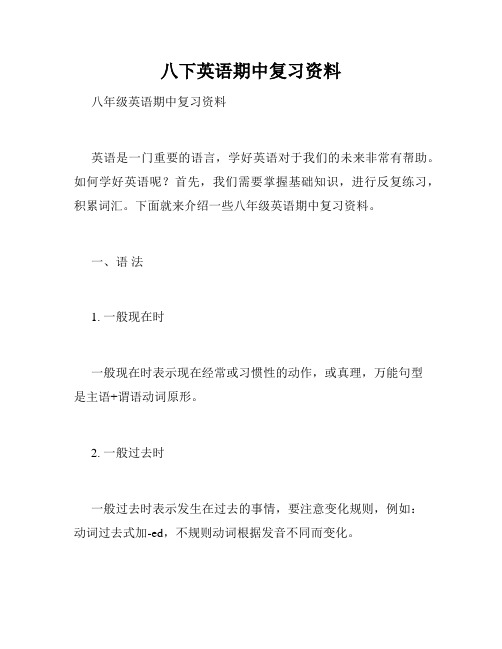
八下英语期中复习资料八年级英语期中复习资料英语是一门重要的语言,学好英语对于我们的未来非常有帮助。
如何学好英语呢?首先,我们需要掌握基础知识,进行反复练习,积累词汇。
下面就来介绍一些八年级英语期中复习资料。
一、语法1. 一般现在时一般现在时表示现在经常或习惯性的动作,或真理,万能句型是主语+谓语动词原形。
2. 一般过去时一般过去时表示发生在过去的事情,要注意变化规则,例如:动词过去式加-ed,不规则动词根据发音不同而变化。
3. 现在进行时现在进行时表示正在进行的动作或者没完没了的状态,一般句型是主语+be动词+动词的ing形式。
4. 值得注意的是,还有一类动词的时态并不好区分,这些动词包括:know, believe, see, hear, taste, smell, feel等,这时要结合上下文去分析他所表示的时态。
二、词汇1. 同义词和反义词同义词指意思相同或近似的词,这样可以增加答题者的词汇量。
例如:blank – empty,angry – mad,beautiful – pretty等。
反义词指意思相反的一组词,常见的有:up – down,hot – cold,heavy –light等。
在理解题干时词汇的理解很重要,尤其是考试时。
2. 词根和词缀掌握一些常见的词根和词缀可以帮助理解生词的含义,比如:dis-(不,错),-ment(动作或状态的结果),-ful(充满…的),-less(没有…的)等等。
三、阅读阅读是英语学习和考试中非常重要的一环。
要懂得取舍,分清主次,根据问题进行信息搜索和筛选,然后进行适当的阅读理解和写作。
四、听力听力是我们说和写英语的基础,强化听力训练是非常有必要的。
增强听力理解能力需要注意听力技巧,比如:预测、类比、猜词、注意语调和重读等等。
五、口语提高口语表达能力需要平时积累,扩大词汇量,练习口语,多听、多说、多看、多写。
六、写作写作可以让我们更好地理解英语,通过写作提高阅读理解能力。
八年级英语期中复习提纲
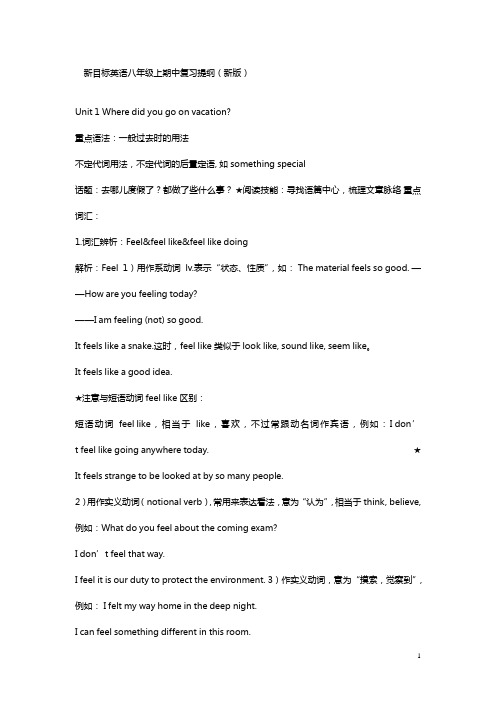
新目标英语八年级上期中复习提纲(新版)Unit1Where did you go on vacation?重点语法:一般过去时的用法不定代词用法,不定代词的后置定语,如something special话题:去哪儿度假了?都做了些什么事?★阅读技能:寻找语篇中心,梳理文章脉络重点词汇:1.词汇辨析:Feel&feel like&feel like doing解析:Feel1)用作系动词lv.表示“状态、性质”,如:The material feels so good.——How are you feeling today?——I am feeling(not)so good.It feels like a snake.这时,feel like类似于look like,sound like,seem like。
It feels like a good idea.★注意与短语动词feel like区别:短语动词feel like,相当于like,喜欢,不过常跟动名词作宾语,例如:I don’t feel like going anywhere today.★It feels strange to be looked at by so many people.2)用作实义动词(notional verb),常用来表达看法,意为“认为”,相当于think,believe,例如:What do you feel about the coming exam?I don’t feel that way.I feel it is our duty to protect the environment.3)作实义动词,意为“摸索,觉察到”,例如:I felt my way home in the deep night.I can feel something different in this room.2.Wait forTime and tide waits for no man.You can’t wait for an opportunity,but create it.Could you please wait for me for a few secon ds?I waited for him for half an hour.3.Arrive at/in=get to=reach,到达某地,得出结论We arrived at/in(=got to/reached)London the day before.We arrived at/in(=got to/reached)a conclusion after a heated discussion.经过一番激烈的讨论,我们得出了结论。
八年级英语上学期期中复习大纲
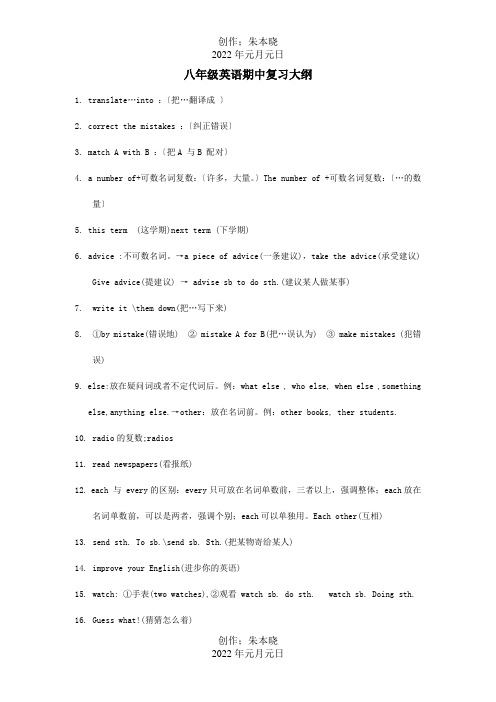
八年级英语期中复习大纲1. translate…into :〔把…翻译成〕2. correct the mistakes :〔纠正错误〕3. match A with B :〔把A 与B 配对〕4. a number of+可数名词复数:〔许多,大量。
〕The number of +可数名词复数:〔…的数量〕5. this term (这学期)next term (下学期)6. advice :不可数名词。
→a piece of advice(一条建议),take the advice(承受建议)Give advice(提建议) → advise sb to do sth.(建议某人做某事)7. write it \them down(把…写下来)8. ①by mistake(错误地) ② mistake A for B(把…误认为) ③ make mistakes (犯错误)9. else:放在疑问词或者不定代词后。
例:what else , who else, when else ,somethingelse,anything else.→other:放在名词前。
例:other books, ther students.10. radio的复数;radios11. read newspapers(看报纸)12. each 与 every的区别:every只可放在名词单数前,三者以上,强调整体;each放在名词单数前,可以是两者,强调个别;each可以单独用。
Each other(互相)13. send sth. To sb.\send sb. Sth.(把某物寄给某人)14. improve your English(进步你的英语)15. watch: ①手表(two watches),②观看 watch sb. do sth. watch sb. Doing sth.16. Guess what!(猜猜怎么着)17. enjoy yourself(玩得很愉快)→have a good time18. have a conversation(谈话) 19. take a deep breath(做深呼吸)20. smile at(对…微笑)21.remember to do sth.〔记着去做某事〕 remember doing sth.(记得做过某事)→Foorget doing sth.22. piece : a piece of news, two pieces of bread, three pieces of music.23. all the time (总是)24. wish :①wish to do sth. ② wish sb. to do sth. ③ wish + that 从句〔从句常用过去时〕表示难以实现的愿望。
初二上册期中英语复习题纲

初二上册期中英语复习题纲# 初二上册期中英语复习题纲一、词汇复习1. 重点词汇:确保掌握每个单元的核心词汇,包括名词、动词、形容词、副词等。
2. 词组搭配:复习常用词组和固定搭配,注意它们的用法和语境。
3. 反义词:掌握常见词汇的反义词,增强词汇的运用能力。
4. 同义替换:学习如何使用同义词进行句子的同义替换,提高语言的丰富性。
二、语法要点1. 时态:重点复习一般现在时、一般过去时和一般将来时的构成和用法。
2. 语态:掌握被动语态的构成和使用场合。
3. 非谓语动词:复习动名词、不定式和分词的用法。
4. 从句:重点复习宾语从句、状语从句和定语从句的构成和用法。
5. 疑问句:熟练掌握一般疑问句、特殊疑问句和选择疑问句的构成。
三、句型结构1. 简单句:复习简单句的基本结构,如主语+谓语+宾语。
2. 并列句:学习使用并列连词连接两个或多个简单句。
3. 复合句:掌握主从复合句的结构和用法。
4. 强调句:学习如何使用强调句型来突出句子的某个部分。
四、阅读理解1. 快速阅读:练习快速浏览文章,抓住主旨大意。
2. 细节理解:通过练习,提高对文章具体信息的把握能力。
3. 推理判断:培养根据文章内容进行逻辑推理和判断的能力。
4. 词汇理解:学会根据上下文猜测生词的意思。
五、完形填空1. 语境理解:通过上下文判断空格处的合适词汇。
2. 逻辑关系:注意句子之间的逻辑关系,选择恰当的连接词。
3. 固定搭配:熟悉常用词组和固定搭配,提高填空的准确率。
六、写作技巧1. 文章结构:掌握英语写作的基本结构,如引言、主体和结尾。
2. 句式变化:学会使用不同的句式,使文章更加丰富多样。
3. 词汇运用:恰当使用高级词汇和短语,提高文章的表现力。
4. 语法准确性:注意语法的正确使用,避免语法错误。
七、听力训练1. 听力理解:通过听力练习,提高对英语口语的理解能力。
2. 关键词捕捉:学会在听力材料中捕捉关键词和主要信息。
3. 听力填空:练习根据听到的内容填写空缺部分。
八下期中复习提纲
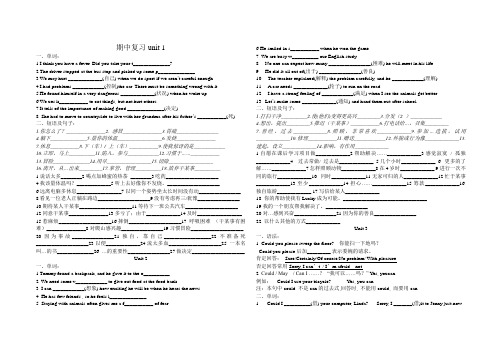
期中复习unit 1一、单词:1.I think you have a fever. Did you take your t______________?2.The driver stopped at the bus stop and picked up some p______________.3.We may hurt _____________(自己) when we do sport if we aren’t careful enough.4.I had problems ____________(控制)the car. There must be something wrong with it.5.He found himself in a very dangerous _____________(状况) when he woke up.6.We ues k___________ to cut things, but not hurt others.7.It tells of the importance of making good ______________(决定).8. She had to move to countryside to live with her grandma after his father’s ___________(死).二、短语及句子:1.你怎么了?_______________2. 感冒_______________3.胃痛________________4.躺下______________5.量你的体温_________________6.发烧_______________7.休息___________8.下(车)/ 上(车)___________9.使我惊讶的是____________10.立即,马上__________11.陷入,参与____________12.习惯于……___________13.冒险______________14.用尽_________________15.切除_________________16.离开,从…出来_________17.掌管,管理__________18.放弃干某事__________1说话太多________2.喝点加蜂蜜的热茶________3.吃药____________________4.我该量体温吗?_____________5.听上去好像你不发烧。
初二上学期英语期中复习提纲
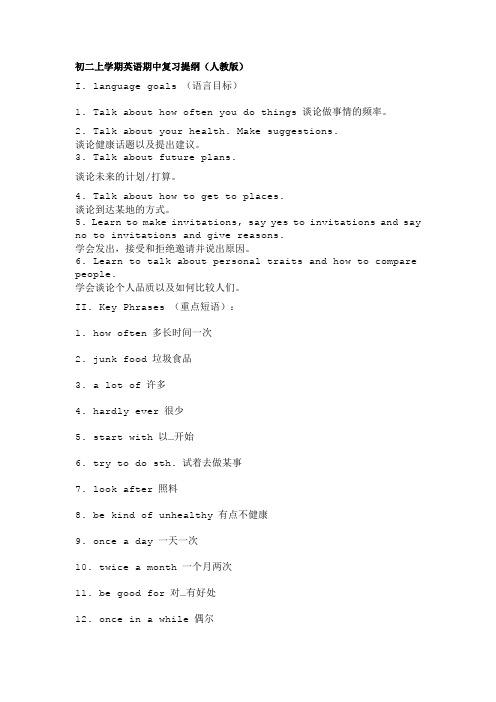
初二上学期英语期中复习提纲(人教版)I. language goals (语言目标)1. Talk about how often you do things 谈论做事情的频率。
2. Talk about your health. Make suggestions.谈论健康话题以及提出建议。
3. Talk about future plans.谈论未来的计划/打算。
4. Talk about how to get to places.谈论到达某地的方式。
5. Learn to make invitations, say yes to invitations and say no to invitations and give reasons.学会发出,接受和拒绝邀请并说出原因。
6. Learn to talk about personal traits and how to compare people.学会谈论个人品质以及如何比较人们。
II. Key Phrases (重点短语):1. how often 多长时间一次2. junk food 垃圾食品3. a lot of 许多4. hardly ever 很少5. start with 以…开始6. try to do sth. 试着去做某事7. look after 照料8. be kind of unhealthy 有点不健康9. once a day 一天一次10. twice a month 一个月两次11. be good for 对…有好处12. once in a while 偶尔13. see a doctor / dentist 看病/看牙医14. get a cold / fever 感冒/发烧15. have a stomachache 肚子疼16. have a toothache 牙疼17. have a sore throat 嗓子疼18. lie down and rest 躺下休息19. drink hot tea with honey 喝加蜂蜜的热茶20. be stressed out 紧张21. listen to … 听…22. get tired 变的疲劳23. keep healthy 保持健康24. at the moment 此刻;目前25. watch TV 看电视26. play basketball 打篮球27. babysit her sister 照看她的妹妹28. visit my friend 拜访我的朋友29. relax at home 在家放松30. sports camp 运动野营31. something interesting32. go hiking / camping / fishing / shopping / sightseeing 去徒步旅行/野营/钓鱼/购物/观光33. go away 离开34. get back to school 返回学校35. stay for a week 呆一个星期36. go bike riding 骑自行车兜风37. takes walks 散步38. rent videos 租录像带39. sleep a lot 睡得多40. think about 考虑41. take the subway / bus / boat / plane乘地铁/公共车/小船/飞机42. get to 到达43. go by bus / plane / boat 乘公共车/飞机/小船44. train / subway / bus station 火车/地铁/公共车站45. bus ride 乘公共车的旅行46. ride a bike 骑自行车47. bus stop 公共汽车站48. on foot 步行49. leave for 离开去…50. school bus 学校班车51. the early bus 早班车52. be different from 与…不同53. half past six 六点半54. in North America 在北美洲55. a quick breakfast 快捷的早餐56. need to do 需要做…57. more than 多于58. play soccer 踢足球59. baseball game 棒球比赛60. school team 校队61. come over to 过来到…62. the day after tomorrow 后天63. be good at 擅长于…64. two years ago 两年前65. be outgoing 外向的66. all the time 一直67. in some ways 在一些方面68. look the same 看起来一样69. talk to everyone 与大家谈话70. make me laugh 使我笑III. Key Sentence Structures 重要句型:Unit 1:1. -What do you usually do on weekends?-I usually go to the movies.2. -What does he sometimes do on weekends? -He sometimes surfs the Internet.3. How often do you exercise?I exercise once a week.4. How often does she eat vegetables?She eats vegetables three times a day.5. Most of the students go to the beach every year.6. It makes a big difference to my grades.7. My eating habits are pretty good.Unit 2:1. What’s the matter?What’s wrong?What’s the trouble?2. I’m not feeling well. I have a cold / fever/ stomachache / sore throat./I have a lot of headaches.3. Maybe you should see the doctor / dentist.You should drink some hot tea with honey.4. You shouldn’t eat anything for 24 hours.5. Don’t get stressed out. It will make you sick.6. I’m sorry to hear that you are not feeling well.Unit 31. -What is she doing for vacation?-She is babysitting her little sister.-That sounds nice / interesting.2. -When are you going?-I’m going on Monday.3. -Where are they going?-They are going to Tibet.4. -Who is she going with?-She is going with her parents.5. -How long is he staying.-He is staying for a week.6. -How is the weather there?-I’m hoping the weather will be nice.7. He is leaving for Hong Kong the first week in June.8. Have a good time.Unit 4:1. -How do you get to school?-I get to school by bus.2. -How does he go to work?-He usually walks to school.3. -How long does it take?-It takes about twenty minutes.4. -How far is it from his home to school?-It’s three miles.5. What do you think of the transportation in your town? Unit 5:1. -Can you come to my party on Wednesday?-Sure, I’d love to. / I’m sorry, I have to have a piano lesson.2. -Can she go to the movies on Saturday?-No, she can’t. She has to help her mom.3. -Can you go to the concert on Monday?-When is it?-It’s at four o’clock o n Friday.4. Thanks a lot for the invitation.5. I’m going to study for a test this evening.6. What’s the date today?Unit 61. Pedro is funnier than Paul.2. Tina is (a little)taller than Tara.3. I am more athletic than my best friend.4. My hair is longer than hers.5. Liu Ying is not as good as her sister.6. In some ways, we look the same.7. For me, a good friend likes doing the same things as me.8. I’m quieter than most of the kids in my class, and so is my friend.9. Who do you think should get the job, Ruth or Rose?IV. Grammar语法:Unit 1:1. 表频率的词汇和短语:always usually often never hardly eversometimes seldom once a day twice a monththree times a week every two weeks once in a while2. 做事情的频率(how often you do things):-What do you usually do in the morning?-I usually read English books. Sometimes I walk in the garden.I hardly ever exercise. I eat vegetables twice a week, but I never eat junk food.3. 如何提问频率“多久一次”-How often does he play tennis?-He plays tennis every day.-How often do you drink milk?-I drink milk once a day.-How often do they go to the movies?-Sometimes.Unit 2:1. 询问别人身体状况:What’s wrong with you?What’s the matter with you?What’s the trouble?2. 提出建议(give advice and make suggestions)-What’s wrong with you?-I have a headache.-You should go to bed and have a rest. You shouldn’t work late. -I have a fever.-You should drink a lot of water. You shouldn’t be stressed out.Unit 3:一般将来时:1. 现在进行时“be+动词ing”可以用来表示一个在最近按计划或安排要进行的动作。
八年级英语期中上册复习提纲

八年级英语期中上册复习提纲1.八年级英语期中上册复习提纲情态动词can(能,会),may(可以,可能,也许),must(必须,一定,应该)have to(必须,不得不)1.肯定句结构:主语+can/may/must+动词原形+其它,例如:I must go now.2.否定句结构:在can/may/must后加not,例如:You mustn’t talk aloud in the library.3.一般疑问句结构:把can/may/must提在主语前,例如:Must you go now?(Yes,I must. No,I needn’t.)May I open the window?(Yes,you may. No,you needn’t.) 2.八年级英语期中上册复习提纲不定代词1.不定代词是不指明代替任何特定名词或形容词的代词。
在句中可以作主语、宾语、表语、定语和状语。
2.常见的不定代词some 一些,某些,某个any一些,任何all 全体,所有both 全部,都none 无人或无either 两者之中的任何一个,这个或那个neither 两者都不each 每个,各自的every 每个,每一的,一切的neither 两个之中一个也不是other 其他的(a)few (a)little(几乎没有)有一些3.八年级英语期中上册复习提纲1.主语:句子所陈述的对象。
2.谓语:主语发出的动作。
一般是有动作意义的.动词。
3.宾语:分为动词宾语和介词宾语,属于动作的承受者。
4.系动词:表示状态或状态变化的动词,没有实际的动作意义。
如be,感官系动词(look,sound,smell,taste和feel)、保持类系动词(keep,stay 和remain)、状态变化类系动词(become、get、turn和go)等。
5.表语:紧跟系动词后面的成分。
6.定语:修饰名词或代词的成分。
7.状语:修饰形容词、副词、动词或句子的成分。
期中复习提纲英语八年级下册
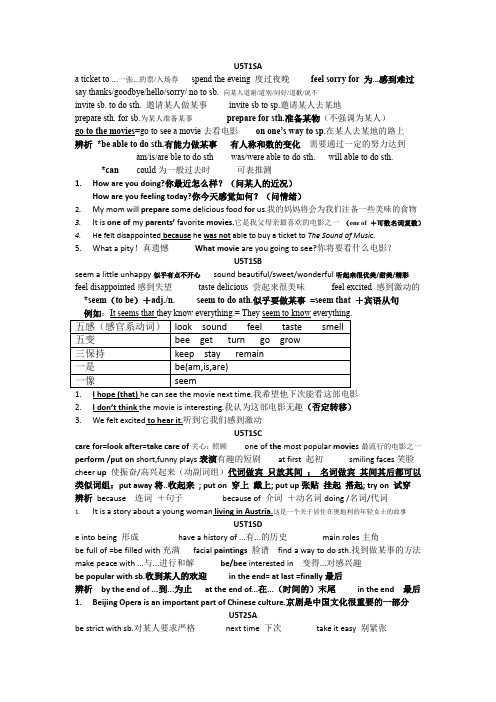
U5T1SAa ticket to ...一张...的票/入场券spend the eveing 度过夜晚feel sorry for 为...感到难过say thanks/goodbye/hello/sorry/ no to sb. 向某人道谢/道别/问好/道歉/说不invite sb. to do sth. 邀请某人做某事invite sb to sp.邀请某人去某地prepare sth. for sb.为某人准备某事prepare for sth.准备某物(不强调为某人)go to the movies=go to see a movie去看电影on one’s way to sp.在某人去某地的路上辨析*be able to do sth.有能力做某事有人称和数的变化需要通过一定的努力达到am/is/are ble to do sth was/were able to do sth. will able to do sth.*can could为一般过去时可表推测1.How are you doing?你最近怎么样?(问某人的近况)How are you feeling today?你今天感觉如何?(问情绪)2.My mom will prepare some delicious food for us.我的妈妈将会为我们注备一些美味的食物3.It is one of my parents’ favorite movies.它是我父母亲最喜欢的电影之一(one of +可数名词复数)4.He felt disappointed because he was not able to buy a ticket to The Sound of Music.5.What a pity!真遗憾What movie are you going to see?你将要看什么电影?U5T1SBseem a little unhappy似乎有点不开心sound beautiful/sweet/wonderful听起来很优美/甜美/精彩feel disappointed感到失望taste delicious 尝起来很美味feel excited 感到激动的*seem(to be)+adj./n. seem to do ath.似乎要做某事=seem that +宾语从句1.I hope (that) he can see the movie next time.我希望他下次能看这部电影2.I don’t think the movie is interesting.我认为这部电影无趣(否定转移)3.We felt excited to hear it.听到它我们感到激动U5T1SCcare for=look after=take care of关心;照顾one of the most popular movie s最流行的电影之一perform /put on short,funny plays表演有趣的短剧at first 起初smiling faces笑脸cheer up使振奋/高兴起来(动副词组)代词做宾只放其间;名词做宾其间其后都可以类似词组:put away将..收起来; put on 穿上戴上; put up张贴挂起搭起; try on 试穿辨析because 连词+句子because of 介词+动名词doing /名词/代词1.It is a story about a young woman living in Austria.这是一个关于居住在奥地利的年轻女士的故事U5T1SDe into being 形成have a history of ...有...的历史main roles主角be full of =be filled with充满facial paintings 脸谱find a way to do sth.找到做某事的方法make peace with ...与...进行和解be/bee interested in 变得...对感兴趣be popular with sb.收到某人的欢迎in the end= at last =finally最后辨析by the end of ...到...为止at the end of...在...(时间的)末尾in the end 最后1.Beijing Opera is an important part of Chinese culture.京剧是中国文化很重要的一部分U5T2SAbe strict with sb.对某人要求严格next time 下次take it easy 别紧张do badly in=be weak in 在某方面表现得差do well in= be good at在某方面表现得好talk with sb.=have a talk with sb.与某人交谈worry about=be worried about为...感到担忧1.What seems to be the problem?出了什么问题(seem to be +n.)2.She feels lonely because she has no friends to talk with.她感到孤独因为她没有可以交谈的朋友。
八年级下册期中复习提纲.doc
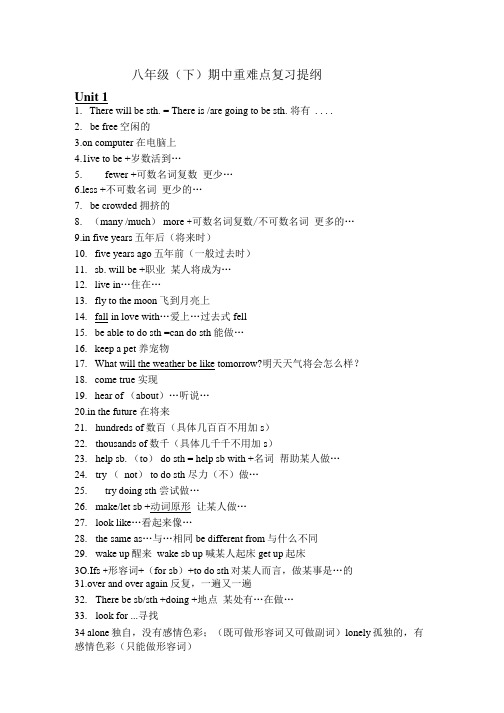
八年级(下)期中重难点复习提纲Unit 11.There will be sth. = There is /are going to be sth. 将有 ....2.be free空闲的3.on computer 在电脑上4.1ive to be +岁数活到…5.fewer +可数名词复数更少…6.less +不可数名词更少的…7.be crowded 拥挤的8.(many /much) more +可数名词复数/不可数名词更多的…9.in five years五年后(将来时)10.five years ago五年前(一般过去时)11.sb. will be +职业某人将成为…12.live in…住在…13.fly to the moon飞到月亮上14.fall in love with…爱上…过去式fell15.be able to do sth =can do sth 能做…16.keep a pet 养宠物17.What will the weather be like tomorrow?明天天气将会怎么样?e true 实现19.hear of (about)…听说…20.in the future 在将来21.hundreds of数百(具体几百百不用加s)22.thousands of数千(具体几千千不用加s)23.help sb. (to) do sth = help sb with +名词帮助某人做…24.try (not) to do sth 尽力(不)做…25.try doing sth 尝试做…26.make/let sb +动词原形让某人做…27.look like…看起来像…28.the same as…与…相同be different from与什么不同29.wake up醒来wake sb up喊某人起床get up起床3O.Ifs +形容词+(for sb)+to do sth对某人而言,做某事是…的31.over and over again 反复,一遍又一遍32.There be sb/sth +doing +地点某处有…在做…33.look for ...寻找34 alone独自,没有感情色彩;(既可做形容词又可做副词)lonely孤独的,有感情色彩(只能做形容词)35.dress sb\ oneself “给某人 / 某人自己穿衣服";dress in/be dressed in "穿... 样式/颜色的衣服”;dress up"装扮,打扮二dress可做名词,指“衣服",一般指女装。
八年级英语中期复习提纲
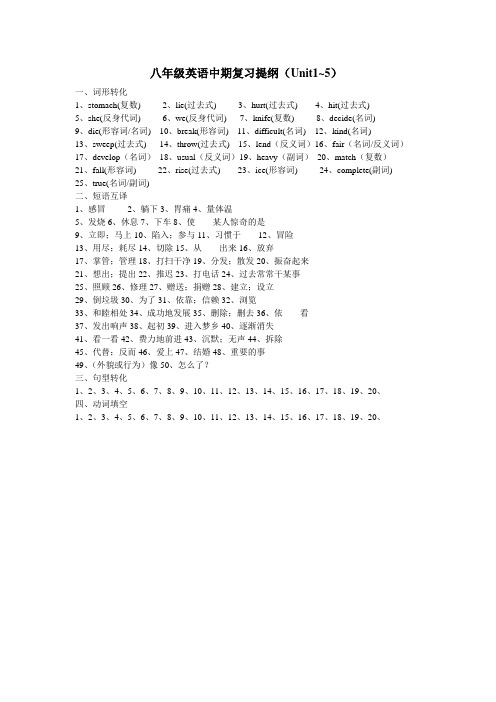
八年级英语中期复习提纲(Unit1~5)一、词形转化1、stomach(复数)2、lie(过去式)3、hurt(过去式)4、hit(过去式)5、she(反身代词)6、we(反身代词)7、knife(复数)8、decide(名词)9、die(形容词/名词) 10、break(形容词) 11、difficult(名词) 12、kind(名词)13、sweep(过去式) 14、throw(过去式) 15、lend(反义词)16、fair(名词/反义词)17、develop(名词)18、usual(反义词)19、heavy(副词)20、match(复数)21、fall(形容词) 22、rise(过去式) 23、ice(形容词) 24、complete(副词)25、true(名词/副词)二、短语互译1、感冒2、躺下3、胃痛4、量体温5、发烧6、休息7、下车8、使------某人惊奇的是9、立即;马上10、陷入;参与11、习惯于------12、冒险13、用尽;耗尽14、切除15、从------出来16、放弃17、掌管;管理18、打扫干净19、分发;散发20、振奋起来21、想出;提出22、推迟23、打电话24、过去常常干某事25、照顾26、修理27、赠送;捐赠28、建立;设立29、倒垃圾30、为了31、依靠;信赖32、浏览33、和睦相处34、成功地发展35、删除;删去36、依------看37、发出响声38、起初39、进入梦乡40、逐渐消失41、看一看42、费力地前进43、沉默;无声44、拆除45、代替;反而46、爱上47、结婚48、重要的事49、(外貌或行为)像50、怎么了?三、句型转化1、2、3、4、5、6、7、8、9、10、11、12、13、14、15、16、17、18、19、20、四、动词填空1、2、3、4、5、6、7、8、9、10、11、12、13、14、15、16、17、18、19、20、。
八年级上册英语复习题纲.doc
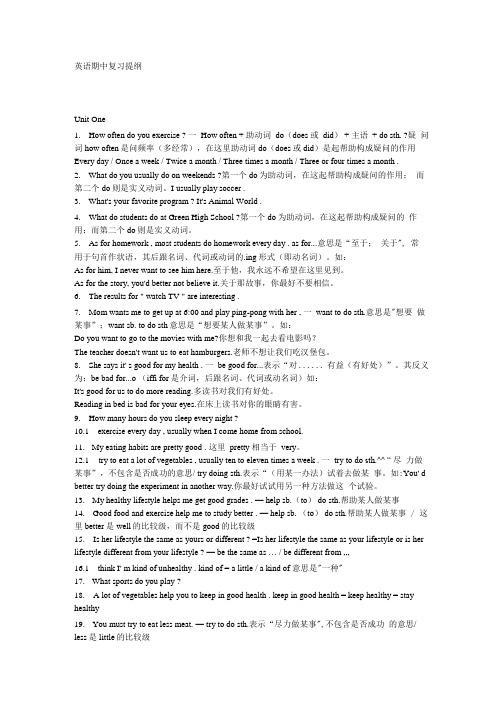
英语期中复习提纲Unit One1.How often do you exercise ? 一How often + 助动词do(does 或did) + 主语+ do sth. ?疑问词how often是问频率(多经常),在这里助动词do(does或did)是起帮助构成疑问的作用Every day / Once a week / Twice a month / Three times a month / Three or four times a month .2.What do you usually do on weekends ?第一个do为助动词,在这起帮助构成疑问的作用;而第二个do则是实义动词。
I usually play soccer .3.What's your favorite program ? It's Animal World .4.What do students do at Green High School ?第一个do为助动词,在这起帮助构成疑问的作用;而第二个do则是实义动词。
5.As for homework , most students do homework every day . as for...意思是“至于;关于", 常用于句首作状语,其后跟名词、代词或动词的.ing形式(即动名词)。
如:As for him, I never want to see him here.至于他,我永远不希望在这里见到。
As for the story, you'd better not believe it.关于那故事,你最好不要相信。
6.The results for " watch TV " are interesting .7.Mom wants me to get up at 6:00 and play ping-pong with her , 一want to do sth.意思是"想要做某事”;want sb. to do sth意思是“想要某人做某事”。
- 1、下载文档前请自行甄别文档内容的完整性,平台不提供额外的编辑、内容补充、找答案等附加服务。
- 2、"仅部分预览"的文档,不可在线预览部分如存在完整性等问题,可反馈申请退款(可完整预览的文档不适用该条件!)。
- 3、如文档侵犯您的权益,请联系客服反馈,我们会尽快为您处理(人工客服工作时间:9:00-18:30)。
初二英语期中复习提纲(1-6单元)基本句型Unit One1. How often do you exercise ? →How often + 助动词do(does或did) + 主语+ do sth. ? 疑问词how often是问频率(多经常),4. What do students do at Green High School ? 第一个do 为助动词, 在这起帮助构成疑问的作用;而第二个do 则是实义动词。
7. Mom wants me to get up at 6:00 and play ping-pong with her . →want to do sth.意思是“想要做某事”;want sb. to do sth.意思是“想要某人做某事”。
8. She says it’s good for my health . →be good for...表示“对……有益(有好处)”12. I try to eat a lot of vegetables , usually ten to eleven times a week . →try to do sth.表示“尽力做某事”,不包含是否成功的意思/ try doing sth. 表示“(用某一办法)试着去做某事”。
如:You’d better try doing the experiment in another way. 你最好试试用另一种方法做这个试验。
13. My healthy lifestyle helps me get good grades . →help sb.(to) do sth.帮助某人做某事. keep in good health = keep healthy = stay healthyUnit Two3. I’m not felling well . 这里well表示身体状况,不能用good代替6. I hope you fell better soon . 这里better是well的比较级8. Maybe you have too much yin . too much后跟不可数名词,而too many后跟可数名词复数10. Everyone gets tired sometimes .11. A sore throat can give you a fever . →12. Don’t get stressed out. It’s not healthy .13. I have a toothache . I need to see a dentist . →need意思为“需要”,作实义动词时,后跟动词不定式,否定式为don’t /doesn’t / didn’t need (to do sth.) ;作情态动词时,只能用于否定句或疑问句中,否定式为needn’t(do sth.) ,除有过去式外,没有其它的形态变化at the moment = nowUnit Three5. How long are you staying ? Just for four days . I don’t like going away for too long .疑问词hwo long是对时间长短或事物的长度提问,在这里是对时间的长短进行提问。
7. Show me your photos when we get back to school .→show sb. sth. = show sth. to sb. 把某给某人看8. I’m going to Hawaii for vacation .for vacation是介词短语,在这里作目的状语,起修饰谓语动词的作用9. What’s it like there ?这里like是介词,而不是动词13. “I always take vacation in Europe ,”he said . “This time I want to do something different .”→(1). want to do sth. (2). 修饰不定代词(something , nothing , anything等)的定语常放在不定代词的后面14. He plans to have a very relaxing vacation . →plan to do sth. 计划做某事16. I just finished making my last movies . →finish doing sth. 完成做某事Unit Four1. How do you get to school ? 疑问词how 在这里是对方式进行提问How do I get there ? 因there是副词,所以不能说get to there Don’t worry .It takes about 25 minutes to walk and 10 minutes by bus .→take sb. some time to do sth. 花费某人……时间做某事.5. In other parts of the world , things are different .depend on 视……而定;决定于10. A small number of students take the subway . →a number of = many 许多11. What do you think of the transportation in your town ? →think of 对……有某种看法Unit Five1. Can you come to my party ? Sure , I’d love(like) to . / I’m sorry , I can’t . I have to help my parents . Can you play tennis with me ?2. I have too much homework this weekend . too much后跟不可数名词;too many后跟可数名词复数6. Come and have fun . / Come and join us .7. On Wednesday , I’m playing tennis with the school team .8. I have to study for my science test on Thursday . have to强调客观原因;而must强调主观原因9. Please keep quiet ! I’m trying to study . →try to do sth. 表示“尽力做某事”, 不包含是否成功的意思10. Do you want to come to my birthday party ? →want to do sth.意思是“想要做某事”11. Li Lei is going fishing with grandpa the whole day . the whole day = all day 整天12. Can you come over to my house ?Unit Six1. I’m more outgoing than my sister . →主语+ 动词+ 形容词比较级别+ than + 比较对象3 enjoy doing sth. = like doing sth. 喜欢做某事4. Liu Li has more than one sister . more than 不止5. Liu Li and Liu Ying have some things in common . →in common (团体)共同的;公有的6. Liu Ying is not as good at sports as her sister . as …as 和……一样(其中as…as之间的形容词必须用原级);它的否定式是:not as(so) …as7. Liu Ying talks more than Liu Li . 这里more是much的比较级,而不是many的比较级9. My friend is the same as me . →be the same as …与……一样/ be different from …与……不同10. I think a good friend makes me laugh . →make sb. do sth. 使某人做某事11. For me , a good friend likes to do the same things as me . →like to do sth.Review of units 1-62. A part of your body beginning with “a ”. →begin with 以……开始(注意:with是介词)6. in one’s free time 在空余时间9. I’m very excited to be taking a vacation around China ! →be excited to do sth. 做某事很激动基本词组19. as for至于第二单元复习1. Have a cold 感冒2. sore back 背痛3. neck and neck 并驾齐驱,齐头并进4. I have a stomachache 我胃痛=There is something wrong with my stomach 5. What’s the matter? 怎么了?= What’s t he trouble (with you)?= What’s your trouble?= What’s wrong (with you)?=What’ the matter (with you)?=What has happened to you?=Is there anything wrong (with you)?= what’s up?6. sore throat 咽喉痛7. lie down and rest 躺下休息8. see a dentist 看牙医9. drink lots of water 多喝水14. I’m not feeling well. 我觉得不太舒服= I don’t feel well.17. stressed out 筋疲力尽19. a healthy lifestyle健康的生活方式20. traditional Chinese doctors传统中医第三单元复习2. visit one’s grandmother 看望奶奶3. spend time with friends和朋友们一起度过时光4. visit cousins 看望表弟等6.go to the beach 去海滩7. go camping 去野营9. go swimming 去游泳10. go boating去划船go fishing 去钓鱼19. do some shopping 买东西20. do some washing 洗衣服27. how about=what about ……怎么样?28. how long 多长时间29. how far 多远第四单元复习3. how about=what about …….怎么样?4.take the subway 乘地铁5.ride a bike 骑自行车6.take the bus乘公共汽车10. by bike, bike bus,by subway, by taxi,(乘坐……车,放在句尾)11. have a quick breakfast迅速吃早饭12. the early bus 早班车13. how far多远14. take sb. to sp.带某人到某处第五单元3. I’d love to 我非常乐意5. study for a test为测验而学习7.visit one’s aunt 看望某人的姑姑10. too much homework 太多家庭作业11. much too interesting 有趣得多13.Thanks for asking(inviting)谢谢邀请16.go to the mall 去购物中心17. soccer practice 足球练习18. look for 寻找19. find out 找到,弄清楚,查明20.studu for the math test 为数学考试而学习第六单元复习3. How old 多大年纪4. how tall 多高7. want/plan to do sth. 意欲,企图9. as you can see 正如你所看到的10.in some ways在某些地方11. we look the same我们看起来一样,They look different他们看起来不同12. the same to ……多……是一样的14. all the same 还是,同样应……15.look like 看起来像…..一样,而look same 看起来很像17. a little taller 高一点18. take sth. from sth. 从某处拿/取出某物19.put sth. in sth. 将某物放入某物中20. make a list of 列出清单22.is popular in school 在学校受欢迎23. is good at sports 擅长体育24. make me laugh 使我发笑。
